Xiao Lv
SheetBrain: A Neuro-Symbolic Agent for Accurate Reasoning over Complex and Large Spreadsheets
Oct 22, 2025Abstract:Understanding and reasoning over complex spreadsheets remain fundamental challenges for large language models (LLMs), which often struggle with accurately capturing the complex structure of tables and ensuring reasoning correctness. In this work, we propose SheetBrain, a neuro-symbolic dual workflow agent framework designed for accurate reasoning over tabular data, supporting both spreadsheet question answering and manipulation tasks. SheetBrain comprises three core modules: an understanding module, which produces a comprehensive overview of the spreadsheet - including sheet summary and query-based problem insight to guide reasoning; an execution module, which integrates a Python sandbox with preloaded table-processing libraries and an Excel helper toolkit for effective multi-turn reasoning; and a validation module, which verifies the correctness of reasoning and answers, triggering re-execution when necessary. We evaluate SheetBrain on multiple public tabular QA and manipulation benchmarks, and introduce SheetBench, a new benchmark targeting large, multi-table, and structurally complex spreadsheets. Experimental results show that SheetBrain significantly improves accuracy on both existing benchmarks and the more challenging scenarios presented in SheetBench. Our code is publicly available at https://github.com/microsoft/SheetBrain.
Light as Deception: GPT-driven Natural Relighting Against Vision-Language Pre-training Models
May 30, 2025Abstract:While adversarial attacks on vision-and-language pretraining (VLP) models have been explored, generating natural adversarial samples crafted through realistic and semantically meaningful perturbations remains an open challenge. Existing methods, primarily designed for classification tasks, struggle when adapted to VLP models due to their restricted optimization spaces, leading to ineffective attacks or unnatural artifacts. To address this, we propose \textbf{LightD}, a novel framework that generates natural adversarial samples for VLP models via semantically guided relighting. Specifically, LightD leverages ChatGPT to propose context-aware initial lighting parameters and integrates a pretrained relighting model (IC-light) to enable diverse lighting adjustments. LightD expands the optimization space while ensuring perturbations align with scene semantics. Additionally, gradient-based optimization is applied to the reference lighting image to further enhance attack effectiveness while maintaining visual naturalness. The effectiveness and superiority of the proposed LightD have been demonstrated across various VLP models in tasks such as image captioning and visual question answering.
MARM: Unlocking the Future of Recommendation Systems through Memory Augmentation and Scalable Complexity
Nov 14, 2024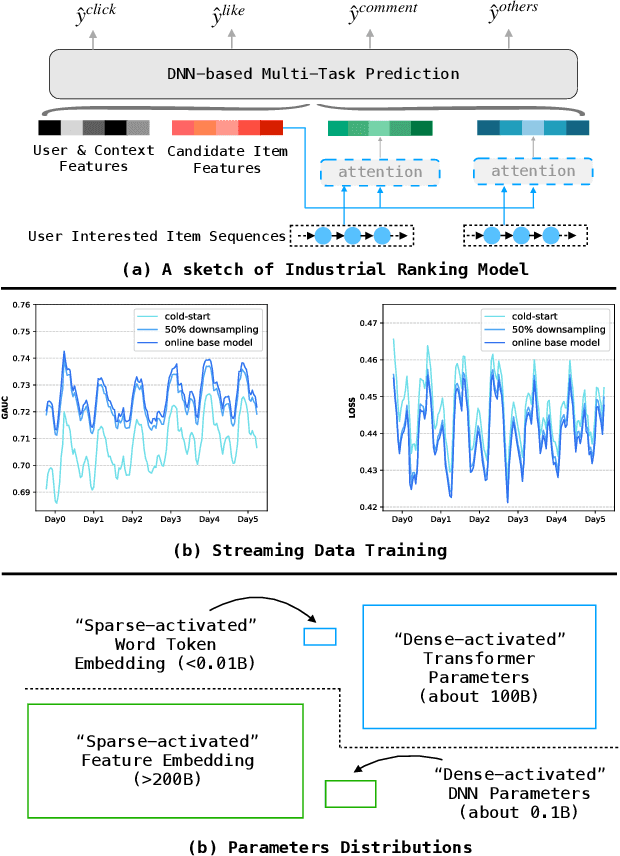
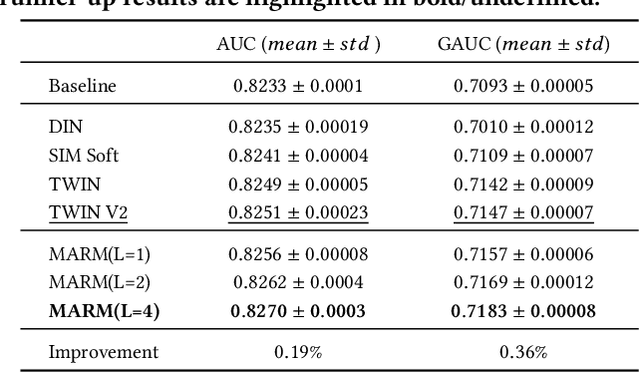
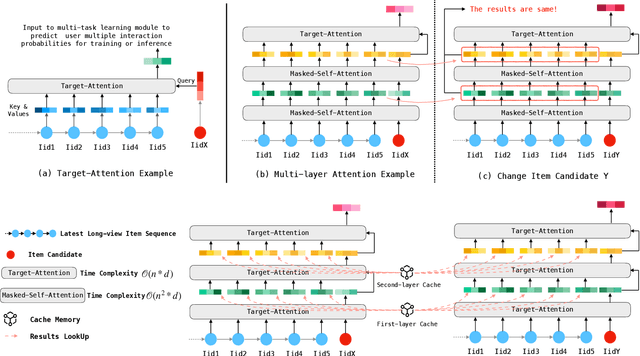
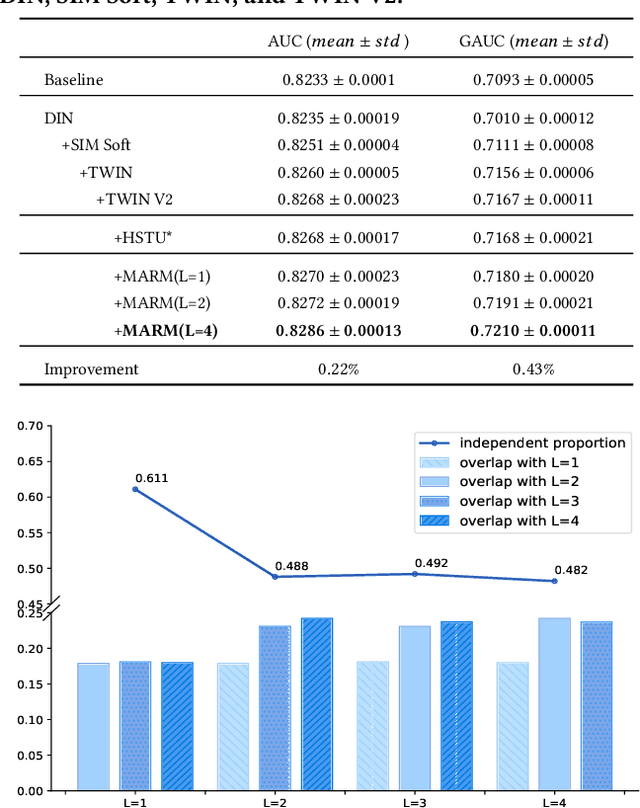
Abstract:Scaling-law has guided the language model designing for past years, however, it is worth noting that the scaling laws of NLP cannot be directly applied to RecSys due to the following reasons: (1) The amount of training samples and model parameters is typically not the bottleneck for the model. Our recommendation system can generate over 50 billion user samples daily, and such a massive amount of training data can easily allow our model parameters to exceed 200 billion, surpassing many LLMs (about 100B). (2) To ensure the stability and robustness of the recommendation system, it is essential to control computational complexity FLOPs carefully. Considering the above differences with LLM, we can draw a conclusion that: for a RecSys model, compared to model parameters, the computational complexity FLOPs is a more expensive factor that requires careful control. In this paper, we propose our milestone work, MARM (Memory Augmented Recommendation Model), which explores a new cache scaling-laws successfully.
Inferring Tabular Analysis Metadata by Infusing Distribution and Knowledge Information
Sep 02, 2022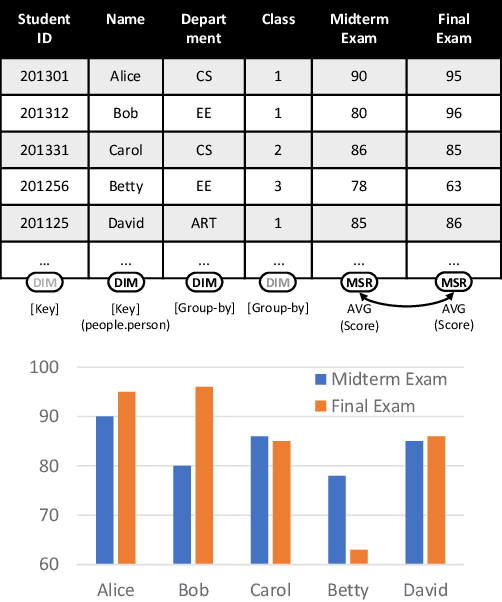
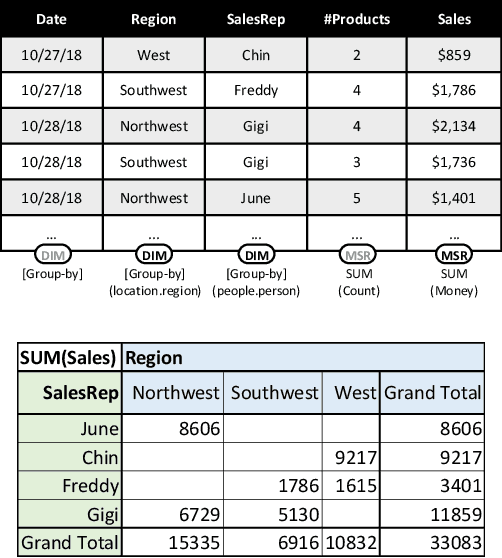
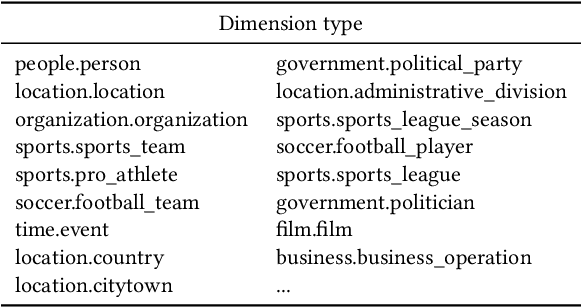
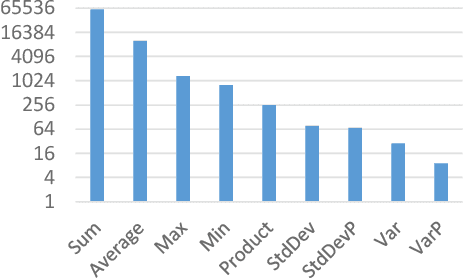
Abstract:Many data analysis tasks heavily rely on a deep understanding of tables (multi-dimensional data). Across the tasks, there exist comonly used metadata attributes of table fields / columns. In this paper, we identify four such analysis metadata: Measure/dimension dichotomy, common field roles, semantic field type, and default aggregation function. While those metadata face challenges of insufficient supervision signals, utilizing existing knowledge and understanding distribution. To inference these metadata for a raw table, we propose our multi-tasking Metadata model which fuses field distribution and knowledge graph information into pre-trained tabular models. For model training and evaluation, we collect a large corpus (~582k tables from private spreadsheet and public tabular datasets) of analysis metadata by using diverse smart supervisions from downstream tasks. Our best model has accuracy = 98%, hit rate at top-1 > 67%, accuracy > 80%, and accuracy = 88% for the four analysis metadata inference tasks, respectively. It outperforms a series of baselines that are based on rules, traditional machine learning methods, and pre-trained tabular models. Analysis metadata models are deployed in a popular data analysis product, helping downstream intelligent features such as insights mining, chart / pivot table recommendation, and natural language QA...
 Add to Chrome
Add to Chrome Add to Firefox
Add to Firefox Add to Edge
Add to Edge